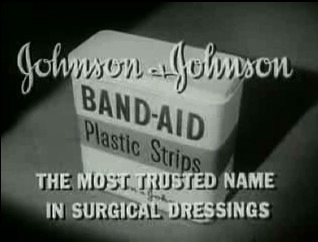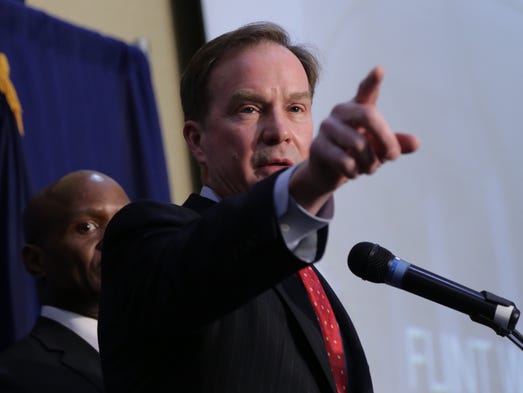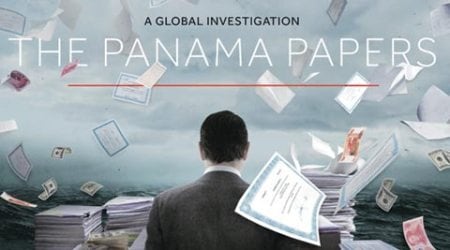 In submitting his new financial disclosure form to the Federal Election Commission, Donald Trump described it as “the largest in the history of the FEC.” Aside from being another example of his compulsive need to boast, the statement seems to demonstrate an astounding ignorance of what the disclosure process is all about.
In submitting his new financial disclosure form to the Federal Election Commission, Donald Trump described it as “the largest in the history of the FEC.” Aside from being another example of his compulsive need to boast, the statement seems to demonstrate an astounding ignorance of what the disclosure process is all about.
It also raises questions as to what Trump’s entire candidacy is all about. Since announcing his bid for the Republican nomination last June, Trump has made countless statements about his supposed business prowess and the success of his various enterprises. He even insisted that multiple corporate bankruptcies were indications of shrewdness rather than failure, and he downplayed the long series of controversies and scandals that have marked his business career.
Trump is not the first candidate to try to use a business track record as the springboard to the presidency. Mitt Romney did essentially the same thing, though in his case he had already distanced himself from Bain Capital and had transitioned to the public sector by serving as the governor of Massachusetts.
Yet in Trump’s case, the objective seems to be more than simply asserting his qualifications based on past business activities. To a great extent, he has used his candidacy to promote his current endeavors. He uses every opportunity to tout his portfolio of businesses, and in March he literally put his wares on display by holding a news conference surrounded by piles of Trump Steaks, Trump Wine and other branded products.
He has also employed the campaign to promote the size of his personal fortune, demonstrating a preoccupation with asserting a net worth of $10 billion in the face of substantially smaller estimates by the likes of Forbes ($4.5 billion) and Bloomberg ($2.9 billion). A decade ago, Trump brought an unsuccessful $5 billion defamation lawsuit against an author who claimed that he was actually worth less than a billion.
Initially, it appeared that Trump’s unrestrained comments about Mexicans would harm his business interests as companies such as NBC Universal, Univision, Macy’s and Serta cut ties with him. Yet the newly released disclosure form suggests something different. The Washington Post concludes that “business has boomed in Donald Trump’s financial empire during the time he has run for president.”
This raises the question: Is Trump primarily interested in serving the country or serving his business interests? The candidate seems to have done little to separate himself from those interests during the campaign. In 1992 Ross Perot resigned as CEO of his computer services company while running for the presidency. Trump has made no secret of the fact that he continues to be involved in commercial endeavors.
Trump has not committed to selling off his interests should he reach the White House. He has suggested that his adult children would get more involved in managing those operations, but it is difficult to believe that he would recuse himself to any great extent. Moreover, Trump’s businesses are so bound up with him personally — his name, his image, etc. — that it is difficult to see how he could separate himself even if he wanted to.
This brings us back to the financial disclosure form. Trump apparently views it as an opportunity to “document” his net worth, but the real purpose, of course, is to identify possible conflicts of interest. In Trump’s case, with hundreds of companies under his control and licensing deals with many others, those potential conflicts are endless.
Trump appears to be oblivious to the issue. If his goal was actually to make the Trump Organization, his holding company, great again, he may very well have succeeded. It remains to be seen how the rest of the country fares.
——-
Note: Subsidy Tracker, the corporate welfare database I produce with my colleagues at Good Jobs First, has reached two milestones: 500,000 entries and $250 billion in taxpayer-funded giveaways.
 Bring back manufacturing jobs: For years this has been put forth as the silver bullet that would reverse the decline in U.S. living standards and put the economy back on a fast track. The only problem is that today’s production positions are not our grandparents’ factory jobs. In fact, they are often as substandard as the much reviled McJobs of the service sector.
Bring back manufacturing jobs: For years this has been put forth as the silver bullet that would reverse the decline in U.S. living standards and put the economy back on a fast track. The only problem is that today’s production positions are not our grandparents’ factory jobs. In fact, they are often as substandard as the much reviled McJobs of the service sector. Baby powder, the product along with Band-Aids that for decades gave Johnson & Johnson a benign image, is now the latest symbol of its deterioration into one of the most unreliable of large corporations. Juries have recently awarded a total of $127 million to women with ovarian cancer who charge that their disease was caused by the talc in the company’s powder.
Baby powder, the product along with Band-Aids that for decades gave Johnson & Johnson a benign image, is now the latest symbol of its deterioration into one of the most unreliable of large corporations. Juries have recently awarded a total of $127 million to women with ovarian cancer who charge that their disease was caused by the talc in the company’s powder. Workers Memorial Day (April 28) is not one of those holidays on which to give thanks and feel good. It is a time to be angry about the fact that nearly 5,000 people each year are killed on the job in the United States in accidents that in many cases were the result of management negligence. Millions more are injured or contract occupational illnesses. The just-published 25th edition of the AFL-CIO’s Death on the Job annual
Workers Memorial Day (April 28) is not one of those holidays on which to give thanks and feel good. It is a time to be angry about the fact that nearly 5,000 people each year are killed on the job in the United States in accidents that in many cases were the result of management negligence. Millions more are injured or contract occupational illnesses. The just-published 25th edition of the AFL-CIO’s Death on the Job annual 
 The publication of the
The publication of the  For more than 30 years, Donald Trump has been almost continuously in the public eye, portraying himself as the epitome of business success and shrewd dealmaking.
For more than 30 years, Donald Trump has been almost continuously in the public eye, portraying himself as the epitome of business success and shrewd dealmaking. Like the other Republican candidates, Donald Trump bashes federal regulation of business. He’s
Like the other Republican candidates, Donald Trump bashes federal regulation of business. He’s  Donald Trump is famous for making high-profile deals using other people’s money. Sometimes those other people are not his business partners or lenders but rather the taxpayers. For a figure who is seen to epitomize unfettered entrepreneurship, he has been relentless in his pursuit of government financial assistance.
Donald Trump is famous for making high-profile deals using other people’s money. Sometimes those other people are not his business partners or lenders but rather the taxpayers. For a figure who is seen to epitomize unfettered entrepreneurship, he has been relentless in his pursuit of government financial assistance.
You must be logged in to post a comment.